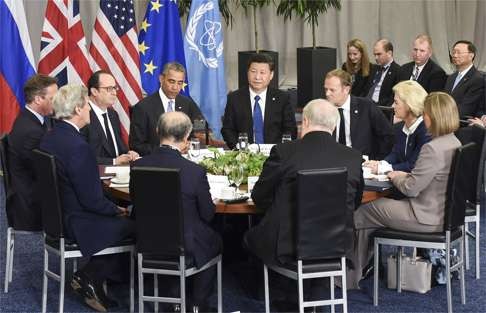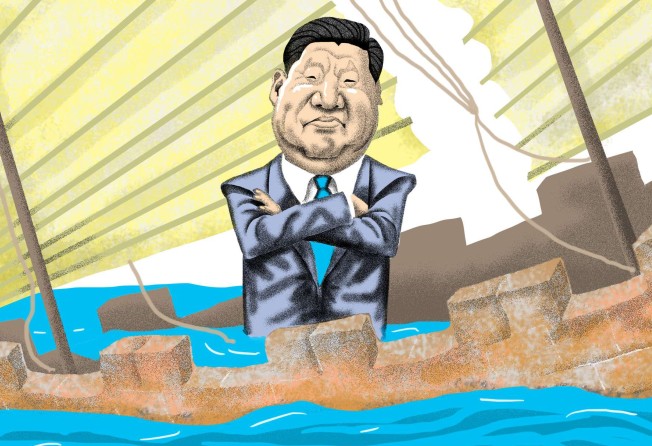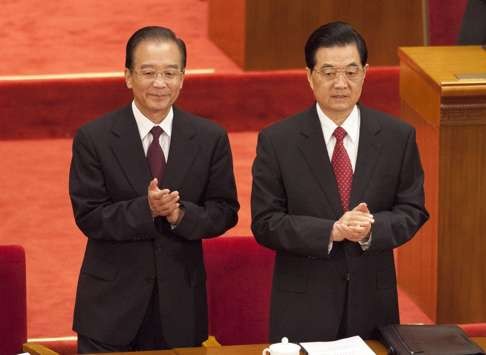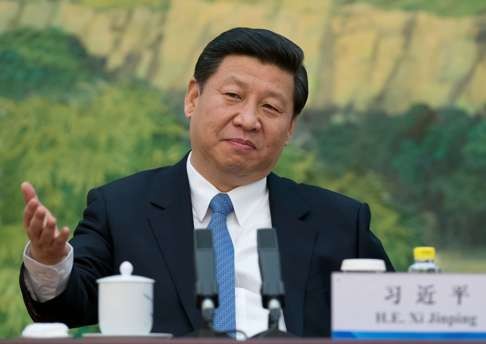
Xi Jinping’s focus on shoring up power comes at the cost of reforms China urgently needs
Steve Tsang says China’s president still does not feel secure enough in his position to introduce the tough policies needed for the country’s sustainable development

A global nuclear security summit held in Washington last week provided the latest illustration of China’s perceived strength – and that of its president, Xi Jinping ( 習近平 ) – on the world stage. Headlines focused on Xi’s meeting with US President Barack Obama, in which China and the United States agreed to work towards denuclearisation of the Korean peninsula and issued a joint statement on nuclear security cooperation.
The issue of China’s construction of military facilities in the South China Sea took a back seat, publicly at least. China says it has no intention of militarising these disputed islets; the US says China is already doing exactly that. The lack of an agreed definition for what constitutes “militarisation” preserves the status quo.

Internationally, Xi projects an outward confidence that his predecessor Hu Jintao (胡錦濤) could never master. He has the significant added advantage of being able to ride on the back of the geopolitical shift brought about by the financial crisis. When Hu was in charge, China was a rapidly emerging power. Now, it is viewed as a near-superpower and is treated as such.
At home, Xi fears his authority slipping
Xi’s self-assurance has contributed to a tendency in the West to gloss over China’s current economic challenges and assume Xi and the Communist Party have the tools to sustain high-level, albeit reduced, economic growth. At home, though, Xi fears his authority slipping, and China’s annual parliamentary-style sessions last month revealed signs of weakness and paranoia.
At a time when China is in desperate need of a bold and clearly communicated strategy for economic reform, specific policy announcements coming out of the legislative meetings were far more limited than the circumstances require. The most noteworthy aspect of the two sessions was the climate of political control in which they were conducted rather than any concrete outcomes. Delegates were reportedly advised against giving interviews to overseas media and Chinese media were subject to even stricter censorship constraints.
Xi’s obsession with power consolidation is overriding policymaking. More than three years after taking the helm, Xi has fallen into a cycle of attempting to strengthen his position almost for the sake of doing so, while failing to deliver solutions that can steer China through a period of deep economic uncertainty.
On becoming leader in 2012, Xi appeared determined to seize the opportunities to introduce sweeping reforms that were missed during the so-called “golden decade” of prosperity that characterised the Hu and Wen Jiabao ( 溫家寶 ) era. While Xi seems to have a genuine desire to implement the kind of reforms that China needs, he clearly still does not feel sufficiently secure to do so.

If the health of the Chinese economy were at a similar level at this time last year, when signs of crisis were not so apparent, then this muddling approach, while not desirable, would at least be tolerable. However, the picture has changed considerably in 12 months.
The party’s current economic sound bite of choice is “the new normal”, referring to sub-7 per cent annual growth. Xi himself has talked of a future of “medium-fast growth”, which one can assume equates to an annual rate of around 6 per cent.
When compared with the double-digit growth of previous years, this may sound like a modest target. The fact is, though, that maintaining this level of growth over the coming years is a hugely ambitious task that has never before been achieved in human history. Yet there is no plan in place to suggest this is either sustainable or realistic. Set this against a backdrop of an alarming decline in China’s foreign exchange reserves, which have fallen from nearly US$4 trillion to US$3.2 trillion in a year, and China is entering dangerous territory.
There is much talk of how the party’s collective leadership model has been cast aside in favour of Xi’s personality-driven “strongman” approach, but this is perhaps premature. There is plenty of evidence to suggest that Xi is far from holding a position of absolute dominance.

The now infamous open letter calling for Xi’s resignation, which was published on a news website on the day the National People’s Congress opened and was signed by “loyal Communist Party members”, attracted a robust response from the authorities. Such a strong official reaction gives credence to the idea that the publication of the letter had the backing of members of the party’s senior ranks, which suggests that Xi has not succeeded in silencing opponents in positions of power.
The preoccupation with power struggles and shifting blame betrays a sense of anxiety
The preoccupation with power struggles and shifting blame at the top of the Chinese leadership betrays a sense of anxiety and furthers the feeling that the party is not on top of the economic and social challenges that it faces. The political manoeuvring is encapsulated by the advent of “Xiconomics”, which has been championed in a flurry of state media articles since the turn of the year.
Xi’s own brand of economic thought is ostensibly a move to sideline “Likonomics”, a term that originated in the West to describe planned reforms that were first announced by Premier Li Keqiang ( 李克強 ). This is part of a clever power play in which Xi emerges as the winner whatever the outcome. As premier, Li still retains responsibility for the country’s economic affairs. If the economy flounders, the buck stops with Li. If the economy flourishes, Xiconomics receives the acclaim.
Tension between senior politicians at the top of government can sometimes drive positive change. And while Hu and Wen worked hand-in-glove for a decade, the seemingly harmonious relationship still failed to deliver promised reforms.
However, at a critical juncture in China’s development, this is not the time for power games that detract from the real tasks at hand.
This relentless jockeying for position shows no signs of abating and in fact is set to increase in intensity as attention turns to the twice-a-decade Communist Party congress next year, at which we should get a first real glimpse into the party’s succession strategy for 2022.
With five of the seven members of the Politburo’s standing committee due to retire in 2017, Xi will see a compelling opportunity to consolidate his power base yet further, while his enemies will be plotting counter-attacks. The upshot is that any substantive economic and political reforms are likely to be put on hold until the dust has settled on the Politburo reshuffle. Can the Chinese economy wait?
Professor Steve Tsang is senior fellow at the China Policy Institute and head of the School of Contemporary Chinese Studies, University of Nottingham, UK